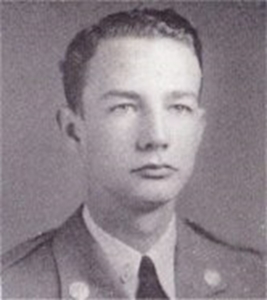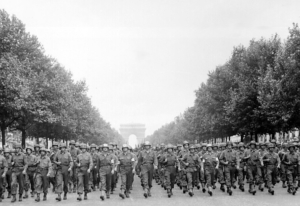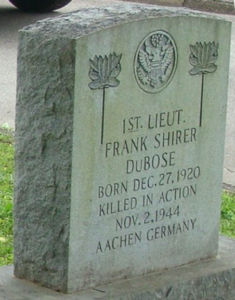Scroll of Honor – Frank DuBose
The Longest Battle
Written by: Kelly Durham
In the autumn of 1944, after its rapid sweep across France, the American Army reached the German frontier. Confronted with the well-prepared and long-established fortifications of the Siegfried Line or Westwall, Germany’s answer to France’s Maginot Line, the Army began what would become its longest battle of World War II, the Huertgen Forest campaign. The 112th Infantry Regiment was among the units committed to the Huertgen battle and Frank Shirer DuBose was one of its officers.
Frank DuBose grew up in Camden, graduating from high school there before enrolling at Clemson College as a member of the Class of 1942. He attended Clemson for three years, majoring in vocational agriculture education. He was a member of Chi Kappa Chi, the social organization composed of cadets from Kershaw County, serving as the group’s secretary-treasurer. He was also a member of the campus chapter of Future Farmers of America.

Men of the 28th Infantry Division march through Paris on August 29, 1944.
After DuBose left Clemson, he took a job teaching at Varnville High School. Called to active duty in September 1942, DuBose was ordered to Fort Benning, Georgia where he was commissioned as a second lieutenant in the infantry. He was assigned to the 112th Infantry Regiment, part of the 28th Infantry Division. In April 1943, Frank married the former Betty Rentz of Varnville. In October, the 28th Infantry Division shipped out, landing in the south of Wales where it continued to train for the coming invasion of Europe.
On July 22, 1944, the 28th Infantry Division landed in Normandy and was quickly committed to Operation Cobra, the American effort to breakout of its beachhead. The division pushed east through the difficult bocage country and a little more than a month later participated in the liberation of Paris. The 28th was one of the American divisions selected to parade down the Champs-Élysées on August 29. Despite the joy of the Parisiennes, for the Americans the fighting was far from over.
After a short rest to receive replacements and new equipment, the division moved forward again, heading toward Germany’s Westwall. Elements of the division crossed the Our River from Luxembourg becoming the first Allied unit to enter Germany. Reaching the mutually supporting fortifications of the Westwall brought the 28th’s advance to a halt. Over the next three months, according to the 28th’s history, “the division accomplished little” in what developed into the Army’s longest continuous battle of the war. Fighting in harsh weather in the heavily-forested region against a foe that was firing from hardened positions—and which in addition was now battling to defend its homeland—DuBose’s regiment suffered heavy casualties, at one point reduced to only three hundred men.
On November 2, DuBose went forward to scout German positions and target them for US artillery units. He was accompanied by his radioman, Anthony Grasso, a nineteen-year-old private from Massachusetts. During their reconnaissance mission, Grasso remained at DuBose’s side carrying the 40-pound radio that enabled the lieutenant to relay the coordinates of the enemy’s positions to the American guns.
Seventy-six years later, Grasso recalled DuBose’s final moments in an interview with The Boston Globe.
As the pair moved through an open field, DuBose believed he saw enemy soldiers in the woods ahead.
“The last words I heard from him were, ‘I need to call in. Give me the phone,’” Grasso said. “He was picking up the phone and ‘Boom!’ I went flying in the air, the blood spilling out of my neck. The next thing I know, I woke up two weeks later in a hospital in Paris.”
DuBose had turned to Grasso’s back, reaching for the phone when the blast threw the lieutenant 30 feet in the air. But at the instant of explosion, he had provided enough of a buffer to protect Grasso, who still carries shrapnel in his head and neck.
Frank Shirer DuBose was awarded the Purple Heart. He was survived by his wife, his mother, and two sisters. In 1949, his remains were returned to Camden.
Over Memorial Day weekend in 2021, Grasso, at age 96, visited DuBose’s grave in the Quaker Cemetery in Camden—two wartime comrades reunited in spirit.
For more information about Frank Shirer DuBose see:
https://soh.alumni.clemson.edu/scroll/frank-shirer-dubose/
For additional information about Clemson University’s Scroll of Honor visit:
https://soh.alumni.clemson.edu/
See also the May 29, 2021 The Boston Globe article by Brian MacQuarrie.
